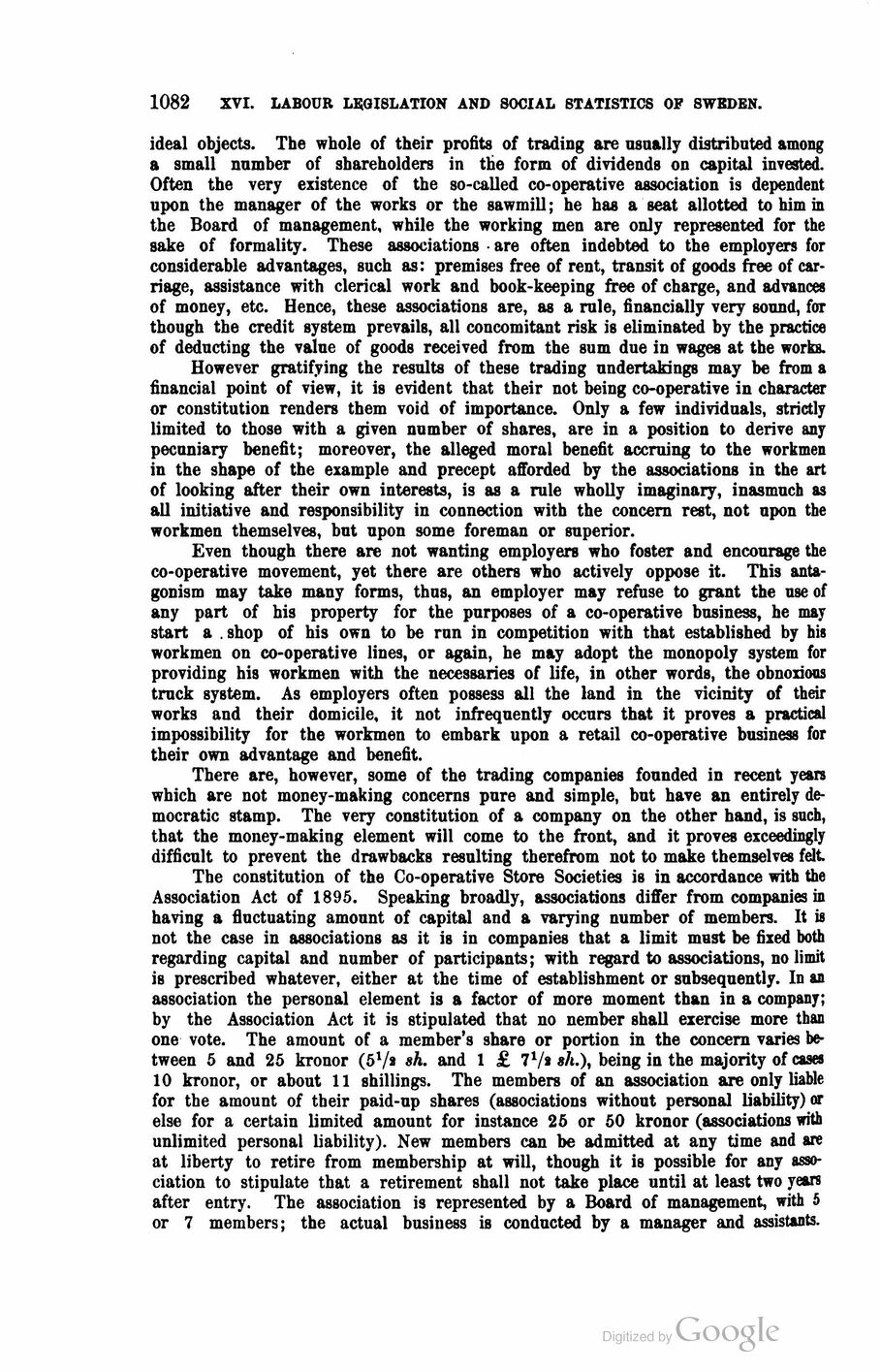
Full resolution (JPEG) - On this page / på denna sida - Second part - XVI. Labour Legislation and Social Statistics - 2. Social Condition and Social Statistics - The Co-operative Movement, by G. H. von Koch, Editor, Stockholm

<< prev. page << föreg. sida << >> nästa sida >> next page >>
Below is the raw OCR text
from the above scanned image.
Do you see an error? Proofread the page now!
Här nedan syns maskintolkade texten från faksimilbilden ovan.
Ser du något fel? Korrekturläs sidan nu!
This page has never been proofread. / Denna sida har aldrig korrekturlästs.
1082 xvi. labour legislation and social statistics of sweden.
ideal objects. The whole of their profits of trading are usually distributed among
a small number of shareholders in the form of dividends on capital invested.
Often the very existence of the so-called co-operative association is dependent
upon the manager of the works or the sawmill; he has a seat allotted to him in
the Board of management, while the working men are only represented for the
sake of formality. These associations are often indebted to the employers for
considerable advantages, such as: premises free of rent, transit of goods free of
carriage, assistance with clerical work and book-keeping free of charge, and advances
of money, etc. Hence, these associations are, as a rule, financially very sound, for
though the credit system prevails, all concomitant risk is eliminated by the practice
of deducting the value of goods received from the sum due in wages at the works.
However gratifying the results of these trading undertakings may be from a
financial point of view, it is evident that their not being co-operative in character
or constitution renders them void of importance. Only a few individuals, strictly
limited to those with a given number of shares, are in a position to derive any
pecuniary benefit; moreover, the alleged moral benefit accruing to the workmen
in the shape of the example and precept afforded by the associations in the art
of looking after their own interests, is as a rule wholly imaginary, inasmuch as
all initiative and responsibility in connection with the concern rest, not upon the
workmen themselves, but upon some foreman or superior.
Even though there are not wanting employers who foster and encourage the
co-operative movement, yet there are others who actively oppose it. This
antagonism may take many forms, thus, an employer may refuse to grant the use of
any part of his property for the purposes of a co-operative business, he may
start a shop of his own to be run in competition with that established by his
workmen on co-operative lines, or again, he may adopt the monopoly system for
providing his workmen with the necessaries of life, in other words, the obnoxious
truck system. As employers often possess all the land in the vicinity of their
works and their domicile, it not infrequently occurs that it proves a practical
impossibility for the workmen to embark upon a retail co-operative business for
their own advantage and benefit.
There are, however, some of the trading companies founded in recent years
which are not money-making concerns pure and simple, but have an entirely
democratic stamp. The very constitution of a company on the other hand, is such,
that the money-making element will come to the front, and it proves exceedingly
difficult to prevent the drawbacks resulting therefrom not to make themselves felt
The constitution of the Co-operative Store Societies is in accordance with the
Association Act of 1895. Speaking broadly, associations differ from companies in
having a fluctuating amount of capital and a varying number of members. It is
not the case in associations as it is in companies that a limit must be fixed both
regarding capital and number of participants; with regard to associations, no limit
is prescribed whatever, either at the time of establishment or subsequently. In an
association the personal element is a factor of more moment than in a company;
by the Association Act it is stipulated that no nember shall exercise more than
one vote. The amount of a member’s share or portion in the concern varies
between 5 and 25 kronor (5l/a sh. and 1 £ 71/» »/».), being in the majority of cases
10 kronor, or about 11 shillings. The members of an association are only liable
for the amount of their paid-up shares (associations without personal liability) or
else for a certain limited amount for instance 25 or 50 kronor (associations with
unlimited personal liability). New members can be admitted at any time and are
at liberty to retire from membership at will, though it is possible for any
association to stipulate that a retirement shall not take place until at least two years
after entry. The association is represented by a Board of management, with 5
or 7 members; the actual business is conducted by a manager and assistants.
<< prev. page << föreg. sida << >> nästa sida >> next page >>